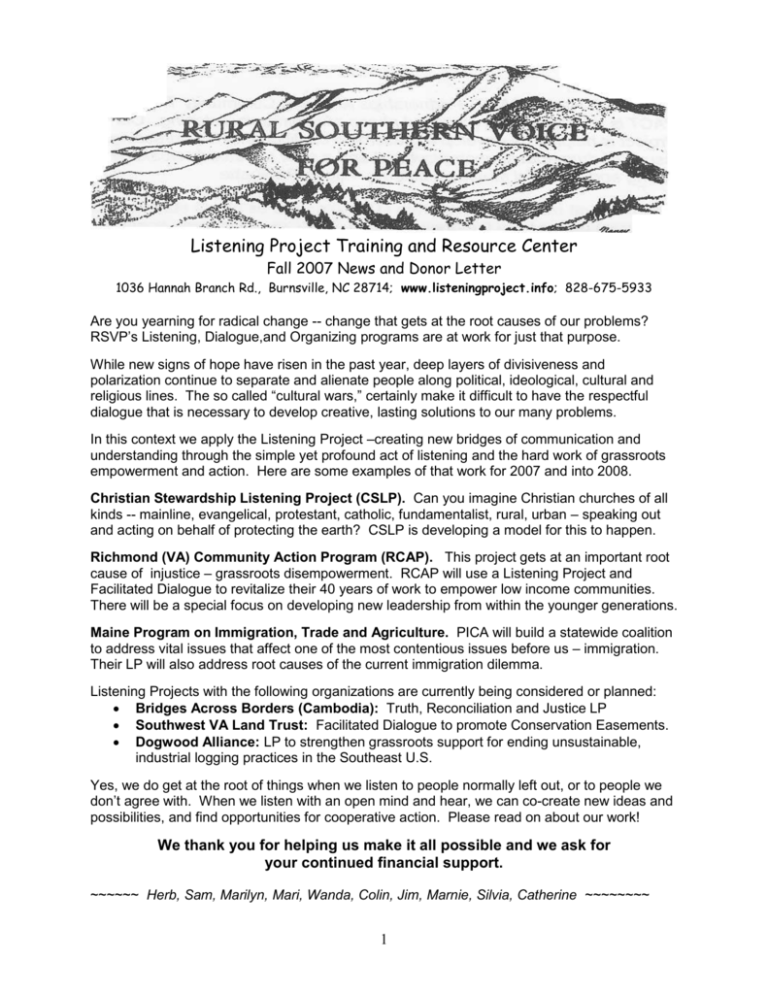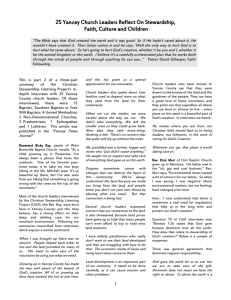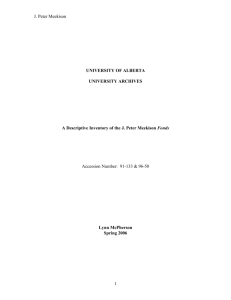2007 - Listening Project
advertisement

Listening Project Training and Resource Center Fall 2007 News and Donor Letter 1036 Hannah Branch Rd., Burnsville, NC 28714; www.listeningproject.info; 828-675-5933 Are you yearning for radical change -- change that gets at the root causes of our problems? RSVP’s Listening, Dialogue,and Organizing programs are at work for just that purpose. While new signs of hope have risen in the past year, deep layers of divisiveness and polarization continue to separate and alienate people along political, ideological, cultural and religious lines. The so called “cultural wars,” certainly make it difficult to have the respectful dialogue that is necessary to develop creative, lasting solutions to our many problems. In this context we apply the Listening Project –creating new bridges of communication and understanding through the simple yet profound act of listening and the hard work of grassroots empowerment and action. Here are some examples of that work for 2007 and into 2008. Christian Stewardship Listening Project (CSLP). Can you imagine Christian churches of all kinds -- mainline, evangelical, protestant, catholic, fundamentalist, rural, urban – speaking out and acting on behalf of protecting the earth? CSLP is developing a model for this to happen. Richmond (VA) Community Action Program (RCAP). This project gets at an important root cause of injustice – grassroots disempowerment. RCAP will use a Listening Project and Facilitated Dialogue to revitalize their 40 years of work to empower low income communities. There will be a special focus on developing new leadership from within the younger generations. Maine Program on Immigration, Trade and Agriculture. PICA will build a statewide coalition to address vital issues that affect one of the most contentious issues before us – immigration. Their LP will also address root causes of the current immigration dilemma. Listening Projects with the following organizations are currently being considered or planned: Bridges Across Borders (Cambodia): Truth, Reconciliation and Justice LP Southwest VA Land Trust: Facilitated Dialogue to promote Conservation Easements. Dogwood Alliance: LP to strengthen grassroots support for ending unsustainable, industrial logging practices in the Southeast U.S. Yes, we do get at the root of things when we listen to people normally left out, or to people we don’t agree with. When we listen with an open mind and hear, we can co-create new ideas and possibilities, and find opportunities for cooperative action. Please read on about our work! We thank you for helping us make it all possible and we ask for your continued financial support. ~~~~~~ Herb, Sam, Marilyn, Mari, Wanda, Colin, Jim, Marnie, Silvia, Catherine ~~~~~~~~ 1 New & Developing Listening Projects The Christian Stewardship LP: Creating Rural, Local Paths to Creation Care fears about environmentalism and to explore common areas of Christian care, concern and cooperation for the protection of God’s earth,” says Rev. Forrest Westall of Mt Mitchell Baptist Church. Rev. Westall serves on the inter-denominational Steering Committee that guides the Christian Stewardship Project. “This is an opportunity,” says Vess, “ to have input on an issue that we have perhaps shied away from because it has been politicized. It’s an opportunity for Christians to reach out to each other about something on which everybody has an opinion, and to express those opinions and be listened to.” Note: The Christian Stewardship Listening Project (CSLP) is currently taking place in Yancey and Madison Counties in rural western North Carolina. The following is excerpted from Yancey County’s weekly paper. “I would hope that people would develop an appreciation of all the reasons we have to care for these mountains”, says Vess. “Hopefully this project can help us all become more aware of this. God’s physical creation and our bodily creation are a package deal. I see us as stewards of what God has created. Here at High Pastures, we have a little part in managing what He has created.” _____________ A group of local residents has formed the Christian Stewardship Listening Project (CSLP) here in Yancey County. It’s stated goal is to: “Find common areas of Christian care, concern, and cooperation for the protection of God’s earth.” According to Claude Vess, director of High Pastures Christian Retreat Center, “We believe care and concern for God’s creation should not be linked or identified with any particular ideology or political group. A Christian re-possession of our stewardship roots will bring new ideas for faith-based “Creation Care” that will strengthen our faith and benefit our community and nation.” Vess is co-chair of the Christian Stewardship Project. Commentary from RSVP: There are few other institutions in the rural South that carry as much influence as our churches. It is therefore unfortunate. that many Christians have been uninvolved with or even resistant to environmental protection. Why? Because they identify “environmentalism” with ideologies, politics or beliefs that they disagree with. CSLP is overcoming this polarization by utilizing Listening Projects and Facilitated Dialogue to create local, Christian based approaches to Creation Care. Contact RSVP if you are interested in this or in Creation Care via other faith groups. The National Religious Partnership for the Environment offers Evangelical, Catholic, Church of Christ and Jewish Creation Care resources. (www.nrpe.org). CSLP will develop a rural, local, and Christian based approach to caring for God’s creation. To do this they will interview pastors, elders, deacons, educators and lay church leaders from a variety of denominations in Yancey County. “The Christian Stewardship Project will enable Christians to express questions and 2 RCAP - Revitalizing 40 Years of Community Empowerment In Low-Income Communities believe the way to start is to do a Listening Project that will enable us to bring in the voices and the leadership of youth. We want to empower rather than just provide services. Jennifer Gavin-Sanchez Richmond, Virginia is one of the most beautiful capital cities in the South, renowned for its tree-lined Monument Ave. dotted with statues of civil war heroes and flanked by mansions with beautiful magnolias and crepe myrtles. But the legacy of segregation in the South left Richmond with institutionalized racism that resulted in our city being more known for its murder rate than its crepe myrtles. This legacy also left us with dilapidated housing and a poverty rate close to 20%. 30.6% of the children and 51.8% of female householders with children under five are living in poverty. Richmond is on the I-95 corridor which makes it a prime spot for drug runners. Virginia is also known for its lax gun laws, another reason for the drug trade and our high murder rate. RCAP’s receives donated used cars that are repaired and driven to work by someone formerly on welfare. Learn more about RCAP: www.rcapva.org Creating a Maine Statewide Program on Immigration, Trade and Agriculture Richmond Community Action Program (RCAP) has been working to solve some of the problems of poverty in Richmond and surrounding counties for the past 40 plus years. We are proud of our work, however, as our volunteers have aged; we have lost touch with the younger members in the community we are pledged to serve—those young mothers living in poverty and the young men who see no alternative to running drugs. In Carasque, El Salvador, it costs people more to grow corn than they can buy it for in the market. The influx of heavily-subsidized, cheap U.S. corn, abetted by free trade policies, has made it impossible for this rural farming community to survive economically. Young people have to leave the community to find work. Many make the dangerous journey to the U.S., looking for a way to support themselves and their families. In Maine, small farmers face many of the same problems. Many Mainers now understand how “free trade” has devastated Maine’s economy – our state lost more than 20% of its manufacturing jobs in just the 2001-2004 period -- a higher proportion than any other state. The job losses, in the tens of thousands, still continue. Yet few Mainers see the ways in which international economic forces and trade policies connect their own lives with what is happening in Central America. Most RCAP funding comes from Federal and State sources (thanks to President Johnson’s Great Society programs in the 60’s). Thus we are federally mandated to provide various services. Our current programs include youth programs such as Discovery Youth which helps seniors visit colleges; Musical Youth, which is a summer program; Freedom school, which is a summer program; and day care food supplements. Our Adult Services include: emergency assistance, job assistance, senior centers, and neighborhood centers. We have not done much community organizing since the 60’s and 70’s but are eager to start, and we PICA (Peace through Inter-American Community Action), is based in Bangor Maine. We have been in existence for over (continued p. 4) 3 God’s Diversity,” will be attended by all conference participants. It will prepare participants to return to their home communities with plans for continuing dialogue, education and action programs on issues of inequality. 20 years now. We have close ties to the Salvadoran rural popular movement, experience working for labor rights and fair trade, and a record of creating local efforts with global connections. This puts us in a unique position to broaden past fair trade education and organizing efforts. By connecting the closely-related challenges of agriculture, trade, immigration, and the survival of rural communities, we have an opportunity to extend understanding of the many ways global economic forces affect us and our communities North and South. The Birmingham, AL. GCLP reports that their project developed continuing relationships with some of their interviewees, and they were able to assist directly and indirectly with some evacuee needs. One of the evacuees, Sherman Brown, has become an effective organizer and advocate for the Katrina survivors. GCLP also continues to inform the public on the ongoing needs of Katrina survivors. Earlier in the year, there were still more than 30,000 families displaced by Hurricanes Katrina and Rita spread across the country and another 13,000 families are marooned in trailer or mobile home parks, where hunger is so prevalent that lines form when the truck from the food bank appears. Post traumatic stress syndrome and an array of other Katrina related health issues also plague many survivors. If you are interested helping, we suggest sending contributions to ACORN to support grassroots organizing: www.acorn.com. We are now working with others to develop a Listening Project and a Facilitated Dialogue program that will help us build a deeper alliance among farmers, native-born and immigrant farm workers, displaced and low income workers, faith based organizations, and other Mainers and Salvadorans who may not yet realize that they have common concerns and interests. This alliance will advocate for: o The rights of immigrants, farmworkers, and other low-wage and marginalized workers o Changes in policies concerning immigrant and immigration (local, state, national) o Changes in trade, agricultural and other policies that benefit nonindustrial farmers and rural communities. To learn more about PICA: www.pica.ws RSVP College Presentations RSVP provided presentations or workshops at four colleges this year. They were: Appalachian State University, Holocaust and Peace Studies Program, .Boone, NC; Cornell University, Center for Transformative Action, Ithaca, New York. Lees McRae College, Peace Studies Program and Nonviolence Symposium; Banner Elk, NC: Mars Hill College, Lifeworks Program, Mars Hill, NC. Two workshops: 1. For Bonner Scholar students committed to service work. 2. For the Appalachian Ministry Experiences Resource Center, which brings divinity students into the Appalachian region to learn about socioeconomic issues and innovative community organizing. These students came to us here in Celo where they also learned about our Environmental Land Trust. Gulf Coast LP Update Training for LP Trainers RSVP’s education / action work utilizing the results of the Gulf Coast Listening Project continues. In Dec., GCLP will be the focus of a three day long conference on multiculturalism conducted by the S.E. Jurisdiction of the United Methodist Church which represents over 12,000 churches. Our three day workshop, entitled: “Listening and Dialogue as Tools for Embracing If you are interested in becoming a Listening Project Organizer / Trainer contact us. Our new 2007 training manual is available through our web site: www.listeningproject.info. ☼☼☼☼☼☼ ~ PLEASE SUPPORT OUR WORK ~ 4







